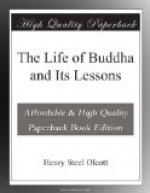To tread its paths with patient,
stainless feet,
Making its dusty
bed, its loneliest wastes
My dwelling, and its meanest
things my mates:
Clad in no prouder
garb than outcasts wear,
Fed with no meals save what
the charitable
Give of their
will, sheltered by no more pomp,
Than the dim cave lends or
the jungle-bush.
This will I do
because the woeful cry
Of life and all flesh living
cometh up
Into my ears,
and all my soul is full
Of pity for the sickness of
this world:
Which I will heal,
if healing may be found
By uttermost renouncing and
strong strife.
Thus masterfully does Sir Edwin Arnold depict the sentiment which provoked this Great Renunciator. The testimony of thousands of millions who, during the last twenty-five centuries, have professed the Buddhistic religion, proves that the secret of human misery was at last solved by this divine self-sacrifice, and the true path to Nirvana opened.
The joy that he brought to the hearts of others, Buddha first tasted himself. He found that the pleasures of the eye, the ear, the taste, touch and smell are fleeting and deceptive: he who gives value to them brings only disappointment and bitter sorrow upon himself. The social differences between men he found were equally arbitrary and illusive; caste bred hatred and selfishness; riches strife, envy and malice. So in founding his Faith he laid the bottom of its foundation-stones upon all this worldly dirt, and its dome in the clear serene of the world of Spirit. He who can mount to a clear conception of Nirvana will find his thought far away above the common joys and sorrows of petty men. As to one who ascends to the top of Chimborazo or the Himalayan crags, and sees men on the earth’s surface crawling to and fro like ants, so equally small do bigots and sectarians appear to him. The mountain climber has under his feet the very clouds from whose sun-painted shapes the poet has figured to himself the golden




